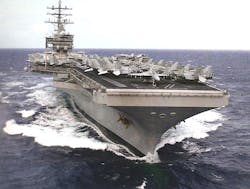Rugged computer servers from Systel chosen for shipboard electronics tactical communications networking
Systel will support NTCDL in partnership with Falstrom, which will design, build, qualify, and deliver below deck electronic rack assemblies to the BAE Systems Electronic Systems segment in Nashua, N.H., the program's prime contractor.
Falstrom specializes in custom rugged enclosures and electronic assemblies for naval shipboard radar, conventional and nuclear power panels, avionics test equipment, and computer enclosures.
Systel is supporting NTCDL with high-density 1U and 3U embedded computing servers for high-speed communications and position, navigation, and timing (PNT) services.
Systel's rugged servers feature several central processing units and graphics processing units for high-performance parallel processing, high-density secure data storage, and high-speed optical fiber data networking.
Two years ago BAE Systems won an $87.7 million Navy contract to develop NTCDL technology that enables Navy surface warships to transmit and receive real-time intelligence, surveillance, and reconnaissance (ISR) data from several sources simultaneously.
The system also enables the Navy to exchange command and control information across disparate networks. The NTCDL helps the Navy share large quantities of critical ISR data across shipboard electronics and networks.
NTCDL provides a real-time exchange of voice, data, imagery, and full-motion video from aircraft, surface warships, submarines, and warfighters on land. It helps the Navy network operations using currently fielded common data link (CDL) equipment, as well as next-generation manned and unmanned systems.
Related: Rugged mission computer for vetronics and other military applications introduced by Systel
The technology uses an open-systems architecture with non-proprietary interfaces, and is reprogrammable to adapt to new and evolving mission needs. BAE Systems is building NTCDL technology at its facilities in Wayne, N.J., and Greenlawn, N.Y.
BAE Systems is working with partner Ball Aerospace to advance the two companies’ joint Multi Link CDL Systems development. Ball is building the Ku-band phased array antenna suite for BAE Systems on the NTCDL project.
These multi-beam planar phased array antennas from Ball Aerospace are based on silicon germanium (SiGe) technologies on one circuit board, which results in a low-profile antenna.
The antennas will initially be installed on naval aircraft carriers to enable the ships to communicate with a range of intelligence, surveillance, and reconnaissance (ISR) platforms. Ball will do the NTCDL work in Westminster, Colo.
For more information contact Systel online at www.systelusa.com, BAE Systems Electronic Systems at www.baesystems.com, or Ball Aerospace at www.ball.com/aerospace.
Ready to make a purchase? Search the Military & Aerospace Electronics Buyer's Guide for companies, new products, press releases, and videos


